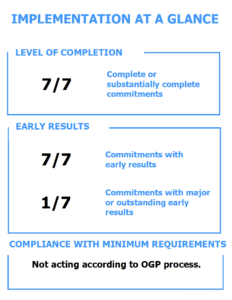Denmark Results Report 2019-2022
- Action Plan: Denmark Action Plan 2019-2021
- Dates Under Review: 2019-2022
- Report Publication Year: 2023
Denmark’s fourth Open Government PartnershipThe Open Government Partnership (OGP) is a multi-stakeholder initiative focused on improving government transparency, ensuring opportunities for citizen participation in public matters, and strengthen... More (OGP) action planAction plans are at the core of a government’s participation in OGP. They are the product of a co-creation process in which government and civil society jointly develop commitments to open governmen... (2019–2022) continued to focus on digitizing the public sector and publishing open dataBy opening up data and making it sharable and reusable, governments can enable informed debate, better decision making, and the development of innovative new services. Technical specifications: Polici.... The action plan resulted in the creation of a portal with data on the climate (CommitmentOGP commitments are promises for reform co-created by governments and civil society and submitted as part of an action plan. Commitments typically include a description of the problem, concrete action... 3) and a whistleblower protection system within the Ministry of JusticeTo address barriers that prevent citizens from having their justice needs met, OGP participating governments are working to expand transparency, accountability, and inclusion into all systems of justi... (Commitment 7). While all commitments were either fully or substantially completed, their impact on opening government was generally marginal. Denmark’s Multi-Stakeholder ForumRegular dialogue between government and civil society is a core element of OGP participation. It builds trust, promotes joint problem-solving, and empowers civil society to influence the design, imple... (MSF) was not consulted during the implementation of the action plan.
Early ResultsEarly results refer to concrete changes in government practice related to transparency, citizen participation, and/or public accountability as a result of a commitment’s implementation. OGP’s Inde... More

Denmark’s fourth action plan focused on digitization and open data. By the end of implementation, all commitments saw early results. The Independent Reporting Mechanism (IRM)The Independent Reporting Mechanism (IRM) is OGP’s accountability arm and the main means of tracking progress in participating countries. The IRM provides independent, evidence-based, and objective ... noted major early results for Commitment 3, where the Climate Atlas has been actively used in school programs and by municipalities. Commitment 7 on whistleblower protection within the Ministry of Justice, identified as noteworthy in the IRM Design Report, saw marginal early results. The Ministry’s whistleblower system has so far received few inquiries, but it supported Denmark’s implementation of the European Union’s 2019 directive on whistleblower protection.
CompletionImplementers must follow through on their commitments for them to achieve impact. For each commitment, OGP’s Independent Reporting Mechanism (IRM) evaluates the degree to which the activities outlin... More
All commitments in the fourth action plan were fully or substantially completed. This was an improvement from the third action plan (2017–2019) where nine of 14 commitments were fully or substantially completed.[1] Most of the planned technical platforms proposed by the commitments were created. It is expected that these new platforms will be continuously updated with new data after the action plan period. Implementation was accelerated because of a structured data policy in commitments that involved connecting data from several public agencies. The public sector representatives interviewed for this report seldom knew that their projects were included in the action plan. This was often because the representatives joined their project after the action plan’s adoption or because the projects would have been implemented regardless of their inclusionOGP participating governments are working to create governments that truly serve all people. Commitments in this area may address persons with disabilities, women and girls, lesbian, gay, bisexual, tr... More in the action plan.
Participation and Co-Creation
The MSF met once during the co-creation processCollaboration between government, civil society and other stakeholders (e.g., citizens, academics, private sector) is at the heart of the OGP process. Participating governments must ensure that a dive.... The Agency for Digital Government (AfDG) did not create participation opportunities during the implementation period, but several lead agencies collaborated with civil society, citizens, and other public agencies. AfDG did not maintain an online repositoryAccess to relevant information is essential for enabling participation and ensuring accountability throughout the OGP process. An OGP repository is an online centralized website, webpage, platform or ... during the action plan’s implementation, nor did it publish a self-assessment report. However, as mentioned above, the lack of participation during the implementation did not negatively affect the completion of commitments.
Implementation in Context
The implementation period for the fourth action plan was initially planned for 2019–2021 but was extended to August 2022 because of the COVID-19 pandemic. Some commitments were delayed because of the run up to the national election in October 2022. While the election campaign and government negotiations to form a new government took place, no ministry or public department could sign contracts.[2] This affected both the rule of law unit within the Danish Appeals Agency (Commitment 6) that waited for a decision on whether the project would receive financial resources to continue and the development of the “My Overview” platform (Commitment 5). The election also affected the OGP Secretariat, as AfDG was moved to a new ministry in December 2022. This created some organizational challenges but has not prevented the continuation of OGP work in Denmark in 2023.
[1] Mikkel Otto Hansen, Independent Reporting Mechanism (IRM): Denmark’s Implementation Report 2017–2019 (Open Government Partnership, June 1, 2020), https://www.opengovpartnership.org/documents/denmark-implementation-report-2017-2019/.
[2] Sine Riis Lund, ”Hvad må embedsmænd lave under en valgkamp? (in Danish), Altinget, October 9, 2022, https://www.altinget.dk/artikel/hvad-maa-embedsmaend-lave-under-en-valgkamp.

Leave a Reply